Character-Driven Exploration of Evangelion's Central Themes
For the longest time, I have wanted to write about Evangelion, the only work of art that, to me, on a 10-point scale, is an 11. At the time of writing, I had finished watching the series for the 7th time, that's once a year since seeing it first. Why I haven't taken this effort to write properly about something I have loved so deeply, why I had been able to only babble incohesively about it to interested friends is that first and foremost it was an experience for me. Experience, as in something to live through in the immediate presence, not working towards some future like analyzing in preparation of writing about it instead of truly watching.
The idea was right up there in the front of her mind. But she didn't know how to say it in words, even to herself. It was a horrible feeling to find things in your head and not know how they fitted.
- Equal Rites
Finally, I decided to watch it once more, but this time forego the experience of it and instead take notes and properly attempt to put into words my what I found to be most important in this wild trip Hideaki Anno has been taking me on each rewatch. For a franchise so popular, that has so much merch you could live off of it, it is a surprisingly esoteric experience. The takeaways of this series are as hard as they are important. Let me be clear that I do not seek to justify my personal rating of 11 by expounding upon its artistic and directorial prowess, nor do I intend to delve into its cultural impact or dissect every minute detail. Instead, my desire is to explicate my own interpretation of the profound messages that I deem noteworthy, and construct an argument or character study of sorts by citing examples from the original series, End of Evangelion, and the Rebuild movies.
Note that this whole text is riddled with spoilers. Watch before reading! Though you may still find some ideas, a lot of the text will not make sense without having seen Evangelion.
And while reading, why not put on the Anxiety Suite from the Evangelion OST by Shiro Sagisu?
Jam's ride on Anno's wild trip begins / Personal intro
During November 2016, I was high and while scrolling r/cyberpunk, I stumbled upon a gif with just the right aesthetics. Up until that moment, I had held the belief that anime was mostly juvenile and not worthy of serious attention. Yet, that 90s grungy feeling futuristic mechanical wonder on display hit the right spots, and when I saw the top comment praising the movie it was from, Ghost in the Shell, for its perfect cyberpunk vibes and philosophy, I thought it was worth checking out. Meditative in nature, with heavy cyberpunk aesthetics and thought-provoking ideas, I was quickly hooked and my eyes were opened. Having unlocked a whole genre I had previously dismissed, I started looking for more recommendations.
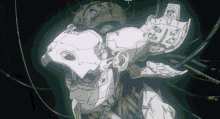
It was and is easy to sell me on a show by mentioning "psychological," "dark," "mindfuck," or "weird." It wasn't long until I found these words used in a lot of the recommendation threads around the web, pointing towards Evangelion. The first time I watched Evangelion in 2017, I had just turned 17. During the first episodes, I wasn't impressed. It was mostly the aesthetics that carried my will to continue. And there was a scratching feeling behind the general juvenile concept of another sexist male self-insert MC who was supposed to save humanity by defeating the monster of the week. The strong directing of the first episodes (episodes 1-6 are considerably stronger than 7-13) overall made me feel like my experience was in competent hands, furthering my interest. Evangelion is wonderful at showing and telling at precise moments in a way that makes it easy to piece together a lot of details without the show having to explicitly convey developments and ideas with words. The directing had no right being this good if it was just another monster-of-the-week type of series. Another telling factor was its insistence on showing logistics. At each turn, NGE shows constructions for new buildings and the repairs on the aftermaths of angel fights. The intercom communications in research sites, hospitals. The semi-believable technobabble and its accompanying UI that fits the world in practicality and aesthetics. The almost-realistic stack traces running on the screens of assistants in the command center. Teams of scientists and techs running advanced (the Magi) and basic systems (small laptops, diesel generators) in tandem. You can often find appropriately realistic jugaad solutions to carry out their experiments and spaces used for them, like huge cables laid out on the floor with pieces of ceiling and wall stripped to make room for it. It is not very different from the spaces you could find at, say, CERN, for example.
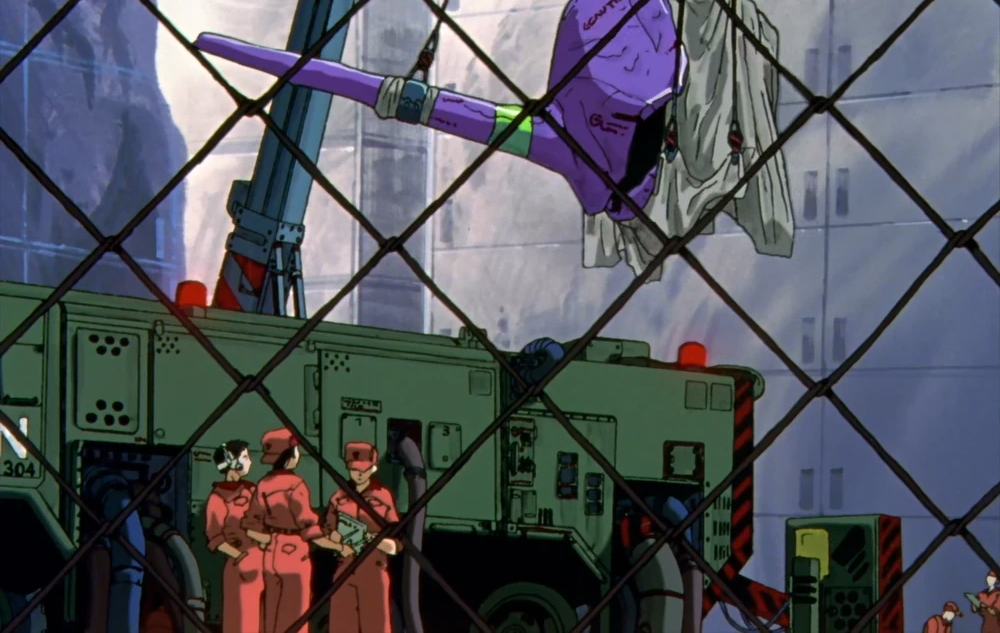
But it seemed like there was something lurking behind all of it. Something more substantial. It is not very subtly hinted at by the MC yelling in the first episode that he doesn't want to be the pilot to save humanity. It seems hopeful, since after all, Mike Pondsmith said that "Cyberpunk is not about saving the world, It's about saving yourself." The overall vibes stay in that will-they-won't-they about delivering on these hints. Only quite late into the show, from the halfway point of the series at episode 16, the script is flipped. Evangelion is a perfectly executed troll: it starts out as yet another anime mecha fantasy, and by the end of it, it is showing you what that world would be like if it were actually real in a very adversarial way. Like many other stories, NGE asks what would happen if a teenager was supposed to save humanity? And the show's answer is a bit different from something like Hunger Games, Pacific Rim, or some other mecha-vs-kaiju story: "they would not want to do it, they would fail and be driven insane in the process, humanity would fall."
A repeated meme I've seen around Reddit is that how much you like Evangelion correlates pretty well to how much you hate yourself. I was the outlier then, feeling good about myself, being in good shape, having no trouble getting good grades with no effort, loving parents at home. I was watching life through this "objective" lens, seeking truths about life, death, and the universe, my purpose in it. I was feeling noble about it, self-righteously so about working to craft my philosopher's stone, feeling superior to peers who were mostly loafing around as one should be at the ripe age of 14 (See the irony in me discovering GitS and Evangelion by tripping on weed and scrolling r/cyberpunk?). Still, I was not the target audience Anno was aiming at: I wasn't one to avoid reality and seek solace in escapism. In fact, I had prided myself on being the antithesis of that, facing what life brought head-on. But in a more roundabout way, I was still engaging in similar behavior. Hiding behind self-improvement addiction, "objectivity," intelligence, unable to see my avoidant attachment style, delivering that 'proper behavior' and 'genius' stereotype that my authority figures were (accidentally) thrusting upon me. I had no idea what depression was: I was one to ask if depression was a fancy word for feeling bummed out and truly mean it. The show hooked on my curiosity about why the characters act the way they do and using that hook, dragged me through the experience of depression. And with that, it helped me understand. I realized the meaning behind my luck in my circumstances that allowed me to face problems, I realized the hidden avoidance problems I had been unable to see regardless of my ideal environment for dealing with it. And I realized that while facing one's demons is something that must be done, some may not be able to in certain times or circumstances. It was humbling and connecting.
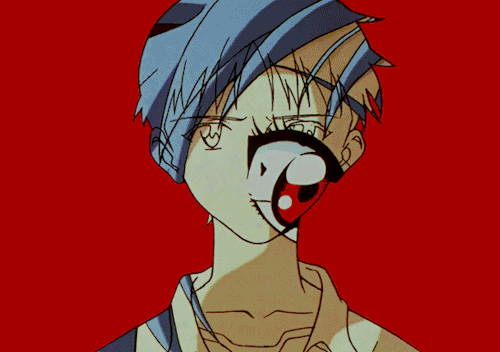
But as mentioned, Evangelion was not something I had thought about or analyzed very deeply. The first few times, I mostly let it wash over me, allowing myself to bathe in the sweet, sweet 90's cyberpunk animation style and the OST that touched me to my core. I let the show rattle me around and beat me up for an emotional, not intellectual, catharsis. These humbling realizations I mentioned happened more in the background and were more related to my own life than to those in the show. During that first watch, Evangelion managed to enthrall me to such an extent that I felt no need to rationalize my experiences. This is impressive, considering I was going through a phase of life where reactively developed objectivism was guiding my mindset. In this phase, I was only watching and reading "The Great Classics," thinking that I should and could find and discern their ultimate value through "objective" metrics and analysis. I would focus on camerawork, lighting, directing, composition, story, plot holes, realism of characters, and the "deepness" of the themes explored, disregarding anything that fell short. I think it was partly due to my natural inclination to sharpen my intellectual teeth, so to speak, and in some way, to live up to the standard implicitly imposed on me by other people and my parents ("you are a genius," "you've always grown faster than others," "you will do great things one day"). In other words, I was identifying and focusing more on my intelligence than any other part of my being. During that time, I had put analysis over experience, yet Evangelion was different. I was so hooked that I had no choice but to just experience it. I think it is partly thanks to the aesthetics that struck a perfect chord with me and partly thanks to the sea of unanswered questions and the messy nature of the studio that struggled with time management, planning and money, which led to any analysis of the plot at large being full of dead ends. This left the analyst in me stumped, unable to write coherently about Evangelion. But it did lead me back to what the show really cares about time and time again: the experience and characters.
So I hope to convey what I found touching and interesting in Evangelion: the painfully honest, brutal way the show takes ownership of a lot of disgusting and hard-to-face aspects of living. "Neon Genesis Evangelion picks its moments of brutality with laser-like acumen. It builds to confrontations with careful, deliberate plotting, setting every choice in motion, giving time and rumination before they strike, even lulling you into split seconds of hope before the proverbial Sword of Damocles comes crashing down". It tells us not to run away and wishes for us to confront the shadows within us by dragging us through them, hoping we find some understanding and compassion in ourselves. At its core, when all is said and done, Evangelion's sentiment is, above all, hopeful.
Cruel Evangelion's Thesis / What is NGE even about?

As mentioned, I believe the show cares most about experience and characters. Lore is interesting; I would even say it is too good at piquing the viewers' interest for its own good. Definitely better than its ability to deliver on its presented mysteries. Whether its lack of regard for lore, narrative, and canonicity was intentional or due to the production issues, I think it is clear that the emphasis was always more on characters than lore, leaving the lore to serve as the backdrop and the vehicle by which the characters are presented. By itself, the lore is similar to that of Metal Gear: full of holes, director ex machinas, technobabble, and unexplained absurdities. So unless you like reading through all supplementary materials in addition to each commentary and interview with staff members and piecing everything together like it's some wild ARG puzzle, you would do well to not focus too much on the lore. Everything besides characters in Evangelion is malleable to produce interesting dynamics between each actor.
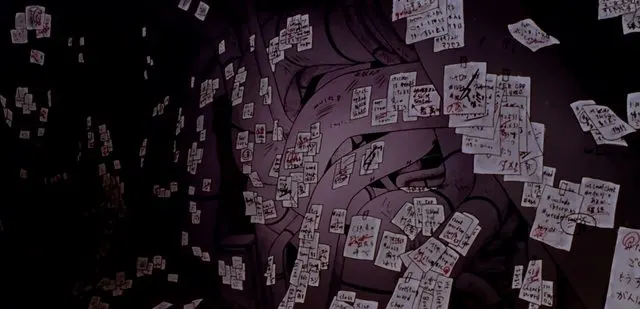
So on characters. The central thesis that Evangelion revolves around is a supposed fundamental lack that humans have, from which all fear comes from and how we deal with it... or more importantly in the context of Evangelion, how we avoid dealing with it. It proposes that man has self-awareness, which by definition means that it perceives itself as separate from others, creating the motivation to return to a sort of unity, to remove oneself from this separatedness. Evangelion starts unpacking this central theme rather subtly with Misato saying to Shinji in episode 1, "you must not run away, you must face your father and yourself." From the get-go, Misato tells us not to run away, to face our fears. And then we proceed to see every single character, including herself, do the exact opposite (maybe save for Kaji). Evangelion states the theme explicitly only after it has explored how characters fail to fill and navigate the holes in their hearts, only after it has forced us to experience their traumas firsthand. It is clear that the show wants us to first live with the characters before we start thinking. Here are a couple of excerpts from the last 2 episodes:
From episode 25:
What people are lacking, the loss in their hearts, in order to fill that void in their hearts, the instrumentation of hearts and souls begins, returning all to nothingness. Gendo: "It is not a return to nothingness, it merely is a return to state of beginning. It is a return to a primal womb that we lost long ago. Souls will become one, attaining eternal peace." Ritsuko: "There is emptiness at the very core of our souls, a fundamental incompleteness." "All of man's accomplishments were to fill that hole." That is what gives rise to the hunger in our hearts, that is what gives rise to fear and insecurity.
From episode 26:
Misato: "At the core we are all the same"
Ritsuko: "We lack something basic"
Asuka "We fear that lack"
/ / /
What do you want?
"Don't hate me!"
What I fear is...
"Rejection"
What I want is...
"To connect and be recognized"
What is it that you wish for?
"A resolution to the insecurity"
What is it that you want?
"A resolution to the loneliness"
Besides the psychological examples through its characters, Evangelion also provides a semi-physical way of identifying this separateness with the AT (Absolute Terror) field. An AT field separates and protects the ego and sense of self of a person from everyone else, allowing them to exist as an individual. I think the AT field is just wonderful. It adds drama and a cool factor to fights while giving the viewer a way to view our own separateness in a new way. It paints a picture of some sort of invisible soul barrier that we have, which, if imagined like that, feels natural that one might want to rid oneself of this barrier. Returning to a state of connectedness without soul barriers seems like a sensible wish: if we really are not just ghosts in shells, but rather we are the same ghost - just in different shells - it has a connecting effect in itself. On AT fields, Kaworu mentions this in Episode 24:
This is the light of my soul. A sacred territory in which no one may intrude. Aren't you Lilin even aware that your AT field is merely that wall that encloses every mind that exists?
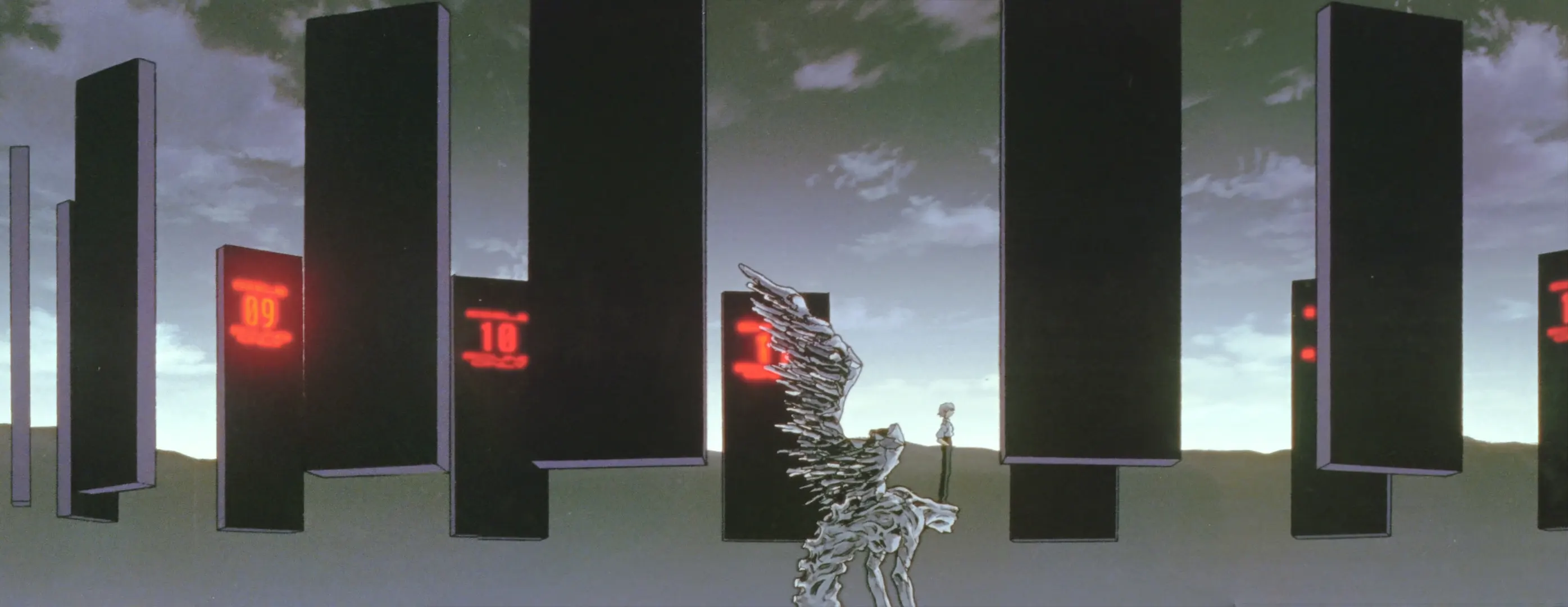 The fundamental lack of man, feeling of lonely separateness is almost one to one with the premise from The Art of Loving by Erich Fromm, which is similar to a lot of psychological, spiritual, and religious teachings (like Jewish Kabbalists path to Adam Qadmon):
The fundamental lack of man, feeling of lonely separateness is almost one to one with the premise from The Art of Loving by Erich Fromm, which is similar to a lot of psychological, spiritual, and religious teachings (like Jewish Kabbalists path to Adam Qadmon):
Man is gifted with reason; he is life being aware of itself he has awareness of himself, of his fellow man, of his past, and of the possibilities of his future. This awareness of himself as a separate entity, the awareness of his own short life span, of the fact that without his will he is born and against his will he dies, that he will die before those whom he loves, or they before him, the awareness of his aloneness and separateness, of his helplessness before the forces of nature and of society, all this makes his separate, disunited existence an unbearable prison. He would become insane could he not liberate himself from this prison and reach out, unite himself in some form or other with men, with the world outside. The experience of separateness arouses anxiety; it is, indeed, the source of all anxiety. Being separate means being cut off, without any capacity to use my human powers. Hence to be separate means to be helpless, unable to grasp the world-things and people-actively; it means that the world can invade me without my ability to react. Thus, separateness is the source of intense anxiety. Beyond that, it arouses shame and the feeling of guilt. The awareness of human separation, without reunion by love-is the source of shame. It is at the same time the source of guilt and anxiety.
What are you, stupid?! / The fundamental holes in Asuka's heart

And the more we give in to the fear and anxiety of separation the more pain we perpetuate it for ourselves and others and the more we find ourselves separated. Much like the characters in Evangelion, so do we bury our heads in sand, warp reality in our heads, or run away in an attempt to rid ourselves of it. Counterproductively this attempt achieves the opposite. In episode 4 Ritsuko and Misato discuss Shinji's way of interacting with others and bring up Schopenhauer's Hedgehog's Dilemma. Core of it is that supposedly the closer people get, the more they hurt each other as if to avoid getting poked by the spines of others. Viewed this way, the goal of relationships becomes finding some sort of ideal distance at which people can experience the warmth of connection without getting stabbed. Sure says about something about Schopenhauer who apparently saw relationships between humans as accidental knife fights.
Evangelion proposes that instead of trying to avoid stabbing others, one should, in the first place, do something about the knives. Put them away, point them in a safer direction, sheath them, anything: in nature, hedgehogs will relax their spines so that they don't injure each other. Alas, this is exactly what the characters are unable to do and thus perpetuate their misery. The show hopes we learn from the characters' mistakes by taking us right through their misery, holding back nothing in the process. The more the characters avoid their shadows and haunting problems, the longer their porcupine spines get. To get truly close to someone, one must do it on the other's terms openly. Which means opening one's heart, being vulnerable, and being prepared to explain oneself, lest we end up like the characters whose metaphorical porcupine spines have grown to the sizes of Evangelion prog-knives. As Rei says to Asuka, "if you don't open your mind to it, the Eva will not move" (episode 22).
Asuka not only does not open her mind to Eva, but others too. For example, Asuka does not engage with Shinji on his terms. She only sees him through her own problems. She is not motivated in seeing Shinji as a person but continues to only project her own insecurities onto him. Episodes 8 and 9 introduce Asuka, and she is quickly defined by her attempts to downplay everyone around him, especially Shinji, whom she sees as a direct threat to her identity as an Eva pilot. It accurately introduces why she has earned the reputation of being the most obnoxious character in the show. She does not give any space for Shinji; she has no curiosity about who he actually is as a living, breathing person. Instead, she goes straight to showing off her Unit-02, making sure to mention that her Eva is a production one while Shinji's is just a test-type Eva, and invites him into the entry plug to "show off her superior pilot skills." In The Power of Now, Eckhart Tolle writes that giving the other person space to be is the most precious gift you can give:
They pay more attention to that than to what the other person is saying, and none at all to what really matters: the Being of the other person underneath the words and the mind. Of course, you cannot feel someone else's Being except through your own. This is the beginning of the realization of oneness, which is love.
/ / /
As long as you are unaware of Being, the reality of other humans will elude you, because you have not found your own. Your mind will like or dislike their form, which is not just their body but includes their mind as well. True relationship becomes possible only when there is an awareness of Being. Coming from Being, you will perceive another person's body and mind as just a screen, as it were, behind which you can feel their true reality, as you feel yours.
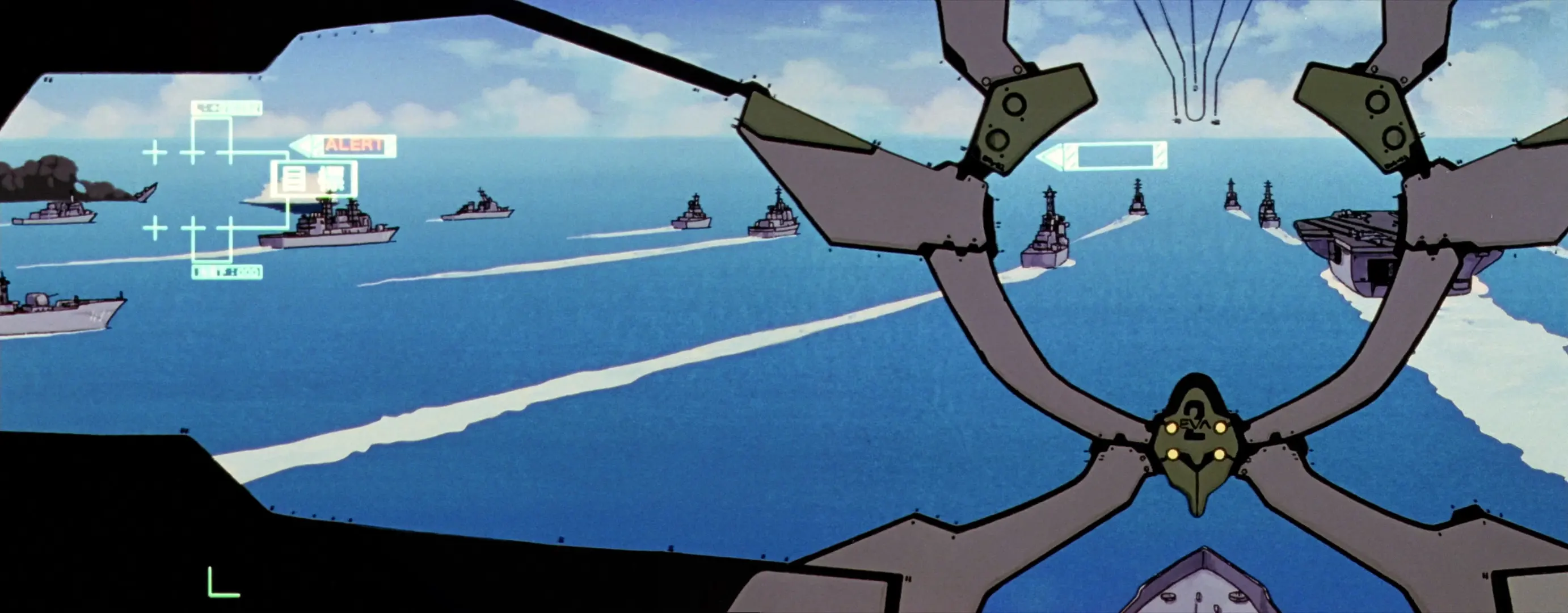
In introducing Asuka this way, the show hopes that the audience is patient enough to give space and attention to the characters in the same way. Instead of dropping the show with "Asuka is obnoxious" or "Shinji, just get in the robot," the show hopes that we ask why they seem that way and how their shortcomings came to be, and how does that factor into how they try to connect with others. Who are they really at their core?
Be kind, for everyone you meet is fighting a hard (decisive) battle.
In episodes 9 and 10, Asuka develops new strategies to prove she is the best by trying to gain Shinji's awe, approval, or attraction. Subconsciously, she shifts her focus from outperforming Shinji to capturing his attention as a way to validate her superiority. She believes that if the best pilot were desperately trying to win her over and she rejected him, it would create a new hierarchy above that of the pilots—a hierarchy of "lovers."
This dynamic reaches a peak in episode 15 when Asuka, out of "boredom," dares Shinji to kiss her. She is disappointed that it remains just a dare and feels defeated because she could not prove her superiority. Instead of reciprocating, Shinji gasps in relief when the kiss ends, showing no sincere interest. Fishing for sincerity, she is unable to present herself, unable to relax her spines, unable confront her desire for him directly. She resorts to what seems safest to her - ambiguous reaching-around-the-corner type of methods of getting his attention - and is disappointed when Shinji subsequently does not take the bait.
Even when she shows concern for Shinji by visiting him at the hospital in episode 16, she stays behind the door instead of going in to ask how he is. During the mind-rape scene in episode 22, she screams at the vision of Shinji: "Why are you there? You won't do anything! You won't help me! You won't even hold me!" (the Japanese words used have strong sexual connotations).
From Asuka's point of view Shinji is refusing both her pilothood and adulthood in a way, denying to show her support and love or even just an attempt at wooing her, and understandably by that she is hurt and disappointed. Yet, from Shinji's point of view, she is just an obnoxious loud whiny child. Shinji not only has his own daddy issues to sort through which makes it doubly hard for him, but has no way of knowing what she is going through. She hopes to keep her heart closed yet still receive support from Shinji. To have the cake and eat it too. However, as long as she doesn't open up and show her vulnerability, Shinji will remain unable to understand or help her.
When Shinji finally shows concern for Asuka after the mind-rape, it is too little too late. His shy comment, "I'm glad you're okay," only triggers Asuka's anger, leading her to snap back with, "I hate you! I hate everything!" By this point, Asuka has become so guarded and defensive that nothing Shinji does can reach her. Although she wishes she could accept his help, she is unable to. In episode 25, she finally reveals her inner conflict: "I don't want to depend on anyone, but I hate it at the same time! It's a pain, I don't want to be alone."
By that point, Asuka had given up on her pilothood and, by extension, herself. In episode 16, Rei snapped at Asuka with the question: "Do you only pilot for the praise of others?" The truth is that not only did she do it for the praise, but it was also all she thought she was. In episode 26, Asuka accepts this and warns Shinji of this fate: "If you put your identity solely on the Eva, the real you will cease to exist. You will then lose Eva along with yourself, like me." From The Power of Now: "Since the ego is a derived sense of self, it needs to identify with external things. It needs to be both defended and fed constantly." So, if Asuka's sense of self is entirely comprised of being an Eva pilot and she is unable to fulfill this role (failing to defeat angels) or this role is taken away from her (her unit being destroyed or rendered inoperable, or Evas no longer being needed), it is understandable that she will experience an existential void. It doesn't help when Asuka starts comparing herself to Shinji in episode 22. She falls even deeper into despair when Shinji appears to be fine after what seemed to her like a horrifying accident where he was absorbed by Unit-01. She starts lamenting both him and Misato, saying she does not "want to use the same water as Shinji and Misato." So, in episode 23, Asuka is seen playing video games for days on end, feeling useless, feeling that she has lost "any value she might have had." She does not see herself in any other way. Either she is a successful pilot, or she is nothing.
I think the only thing she was able to accept was any kind of "proof" that she is living up to the promise she made herself when her mother hanged herself. She promised she would never cry again, she would "grow up faster than others" and not need any dolls and that she would be strong and independent grown up. She'd most rather have Kaji's approval: an epitome of what she considers adult. By refusing to work through her childishness, she perpetuates it and makes it even more defined. Kaji hangs out with her, but refuses her hysteric attempts at getting his attention. Would they be like Misato and Kaji - equally fucked up and seeking temporary soothing on equal grounds - it would be different. But he can see through their imbalance in both mind and body (she is only 14 after all). He is not vying for any kind of attachment from Asuka while it is obvious that she depends on him in a one-sided relationship. In episode 22 she is seen extra desperate: "You're the only one I love Kaji! With you it is all fine, kissing and what's after that even" and when her advance is turned down she rips her shirt open and pleads "but look at me, I am grown up!"
Just like Carl Jung said "what you resist not only persists, but will grow in size" (there's a joke about thermal expansion somewhere here). The more she denies it, the more Kaji distances, the more she gets hurt, the more she denies it... and so on. By trying to force her adulthood into existence, she achieves the opposite. The more Asuka refuses to open up, the less Shinji understands her. This makes her feel even more lonely, causing her to close herself off even further, creating a vicious cycle. In her eyes, both Kaji and Shinji are denying her adulthood. In reality, it is her own mind that denies it: to find the maturity she wishes she must first accept her immaturity, only then can she move past it. In episode 22, when she asks, "You're saying this is my fault, that I am blocking myself?!" the answer is yes. She is indeed blocking herself.
Would you choose unhappiness? If you did not choose it, how did it arise? What is its purpose? Who is keeping it alive if not you? These questions highlight the internal struggle she faces. Her refusal to open up and be vulnerable is what perpetuates her unhappiness and isolation.
Man up, Shinji! / Why Shinji does not want to get in the robot
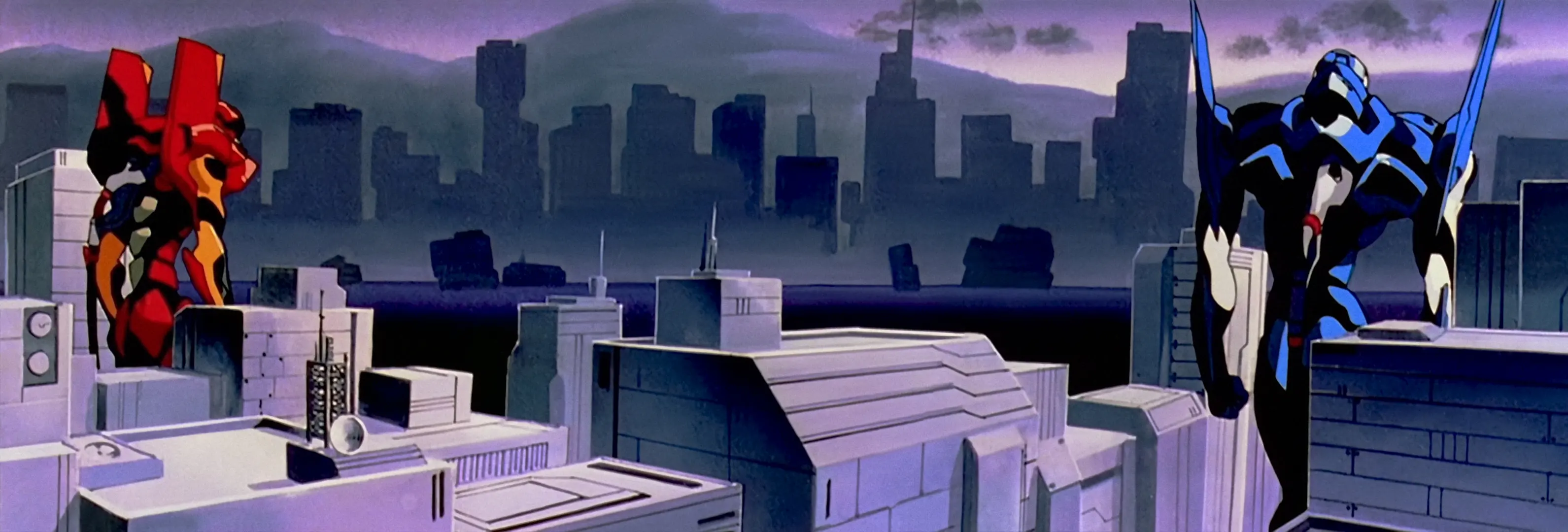
Similarly, just as Asuka sees Shinji as a reminder of her own shortcomings, Shinji views his father as a symbol of his fears. Shinji deep down does wish to know his father but is unable to see Gendo as Gendo. From a young age, after his mother disappeared and his father became distant, Shinji's emotional development stalled. His primary way of coping remained seeking love and understanding from others. Without the support to mature beyond this stage, he subconsciously searches for replacement parent figures while battling a deep-seated fear of abandonment.
When his father finally calls for him, giving him a purpose through piloting the Evangelion, it appears to offer a way to earn love. However, instead of empowering Shinji, piloting the mecha forces him to confront his inner demons and self-deceptions. Unit-01 becomes both his greatest source of pain and his most powerful vehicle for growth.
In episode 4, Shinji tests the limits of his importance, asking through his words and actions if he truly is the only one who can pilot the Eva. If he really is needed, he is of importance, right? He disobeys orders and then dismisses when Misato scolds him for it. Finally, Misato puts him back in his place with: "We don't need someone with that attitude," and broken by those words, he runs away. But in his mind, he's got nothing else. He turns back, realizing that while he was asked to come here, in the end, he needs to feel important more than Nerv apparently needs him as a pilot. In episode 20, Shinji goes over his thought process: "I pilot the Eva because they treat me well, so I have to fight, I have to win, I have to prove my worth," and pleads, "I've done all I can, why can't you be nice to me?!" Of course, just piloting the Eva and shouldering the pain that comes from doing it isn't really a way to earn support and love, much to the dismay of those that parrot the Get In The Fucking Robot Shinji meme. Relationships just are not that transactional. It isn't as simple as going through pain and then demanding love for it. Love is something that is given, not taken. In episode 25, he is faced with the reality of it: "You're just making excuses, pretending you're sacrificing yourself, it makes you special to play the martyr --- you are being dependent, you live on sympathy --- you want people to need you --- you have to find your own happiness, not wait for someone to give it to you."
Shinji is like a lost animal searching for a master who can bring him happiness and shield him from responsibility. Terrified of more abandonment, he desperately tries to attract and hold onto his parental figures by piloting the Eva, despite the pain and betrayal he endures. He clings to Misato, believing that her presence depends on his role as a pilot, so he feels compelled to continue. His father seemingly only values him for piloting the Eva, so he must persist to earn his praise. In episode 25, overwhelmed and broken, he cries out, "I don't understand what I feel, somebody please help. Somebody please tell me what I have to do."
But it isn't about what others expect of him. It isn't about playing a certain role. It's about the decisions he makes while in that role and the love he gives. It's about Shinji finding what he believes in, what he is willing to do to bring forth his reality. In the series, he froze and then asked his father to stop angel controlling Toji's Eva. In the Rebuilds, there's an equivalent arc with Asuka, and near the end of the Rebuilds, she asks Shinji, "Did you figure out why I wanted to punch you?" "It's because I couldn't make up my mind. When you were inside Unit 3, I didn't help you, and I didn't kill you." Shinji never wants to be the one to pull the trigger but also does not lift a finger to do otherwise. He simply avoids responsibility, delays, and waits for a master to get their hands dirty in his stead. Even when he is faced with his actions directly in Rebuild 3.0 when Kaworu shows and tells him that Shinji's actions directly lead to a mass extinction, he screams, "This is too much to bear! I can't be responsible! There is nothing I can do!" No longer able to shift the blame, he tries deflecting the immovable truth itself. Then Kaworu says that one can't change the past but that "there is no unforgivable sin, there is still hope. There is always hope."
It really is not about whether Shinji "gets in the robot" or not. It's about his unsolved trauma and unfaced shadows that make him desperate for any attention, leading him to make wrong decisions. In the Rebuilds, he is more assertive and direct, "more of a brat" as Asuka says in the beginning of Rebuild 3.0, but it only goes to show that this does not fix anything, it only makes things worse. Because when he finally does find the one thing he is willing to sacrifice everything for - Kaworu in the series, Rei in the Rebuilds - it isn't a problem that he chooses mass extinction, but that he does not want to take accountability for it. He didn't want to crush Kaworu, the only person who truly listened to him. He didn't want to kill half the planet to save the only person who has ever tried to mend his connection to his father. While he might not have been able to act differently given his circumstances, he also avoids acknowledging the consequences.
When core beliefs and hopes about oneself are contradicted by much of the available evidence, it can be genuinely destabilizing. Amygdala hijack raises instinctual fear responses and shelves the rational brain. If the belief that Shinji isn't a bad person is incorrect (In End of Evangelion, Shinji says "Nothing matters, you can all just die"), what other parts of his self-conception are wrong? It is easier, then, to retreat to a safe and comforting cliché: "This isn't who I am. I'm not a bad person. I can't do anything about it!" It's easier to deflect criticism of yourself, be it internal or external, and embrace a mindset that doesn't demand change.
Fearing the "Shinjis in the minds of others," and especially the Shinji in Gendo's mind, he mistook people's inherent inability to help him as hostility in some sense, but it was Shinji himself who could truly help himself. After all, others actually were kind to him, but he needed so much more that he couldn't see that. From episode 25:
"This is your world unless you decide to change reality"
Shinji: "Nothing can change the reality that is!"
"No, you yourself have to make decisions. You wished for a cold, separated world where you could be comfortable by protecting your heart."
He did it using my hands! / Shinji's daddy issues

Shinji and Gendo are the same, but they did not give each other space to realize that. Shinji ran away, and Gendo pushed him away. Neither took steps to address their baggage. And thus, Shinji has not had his chance for individuation: he avoids conflict by apologizing (even for things he is not responsible for) and avoids responsibility by relying on masters to tell him what he is supposed to do. He also avoids facing hard truths by running away. In episode 16, an angel forces Shinji to confront his own shadow in the show's first train cart sequence. The shadow is depicted as Shinji when he was a small boy, the same age as when he ran away from his father. Instead of finding himself, he clings to his parental figures in any way possible to escape pain, seeing it as their responsibility rather than his own.
In Children of Dune, Frank Herbert writes:
The child who refuses to travel in the father's harness, this is the symbol of man's most unique capability. "I do not have to be what my father was. I do not have to obey my father's rules or even believe everything he believed. It is my strength as a human that I can make my own choices of what to believe and what not to believe, of what to be and what not to be."
But we can't escape our past if we don't understand it, and we can't understand it if we avoid it. It is the result of both Shinji and his father that he has not been able to let go, that he has just kept running. In episode 19, Shinji exclaims, "Father betrayed me, he doesn't understand me," and Rei flips it on his head, "why don't you try to understand him?" In his own way, he has asked why Gendo has done what he has, Gendo pushed back with false avoidant answers. Yet, like Asuka projects her problems onto Shinji, Shinji projects his problems onto his father. And on some level, Shinji accepts this in episode 20: "I knew Eva but I ran away, leaving mother and father behind." In 3.0+1.11, Shinji finally gets to face his father and truly tries to understand him: "I'm here because I want to learn about you. I stayed away from you even when I was lonely. I did that because I was afraid I'd finally find out if you disliked me or not. I want to know now, I want to know you, father."
Shinji had been kept from his past, never given the chance to integrate it into his present self. He does say he hates him for that, but I think it is more complicated than that. His desire to find his past, even if subconsciously, keeps him running away and then back to Gendo. In episode 15, Asuka asks, "If he hates him, why does he just not say that to him?" Misato answers understandingly, "he doesn't actually hate him, that's the problem." There's a conflict of maintaining a status quo and changing himself and the relationship with his father. He even finds further hope of mending a way to his past in episode 16, "I thought I hated my father, but now I'm not sure, after he praised me," but the angel forces him to confront the fallacy in such false love, "So you will keep regurgitating those few pleasant moments? --- No one can justify their existence by linking their enjoyable moments into a kind of rosary." In episode 25, Shinji accepts that hearing father's praise was more relief than anything: "I fear being hated by my father."
Misato in 3.0+1.11:
"The only thing a son can do for his father is pat him on his shoulder… or kill him"
Parents bear the full responsibility for how their child turns out. Nature vs nurture, but since nurture is the only thing that can be truly controlled, that is why I am putting so much weight on it. Not that parents should be blamed for all of what their children become, but they are responsible. Blame and responsibility operate on separate ends of this problem. In fact, raising a child is an impossible responsibility to deliver on in its entirety, which means that every single person carries their own baggage of mommy/daddy issues and traumas, and that is fine. What Gendo was doing, however, was refusing his responsibility by avoiding Shinji, and for that, he can be blamed. Gendo would rather be in continual self-inflicted pain than take a leap into the unknown and risk losing the familiar unhappy self. But by avoiding his responsibility, he has ensured that Shinji inherits all of his misery.
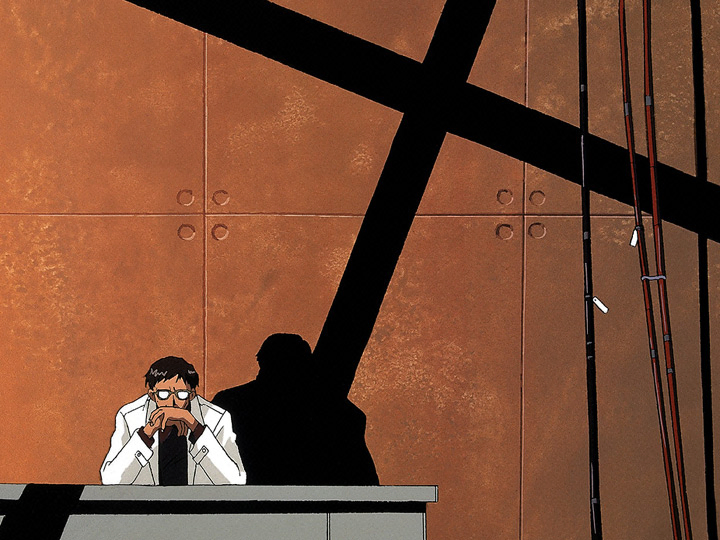
For example, Shinji inherited his liking for playing the martyr from Gendo. Gendo's martyrdom is conveyed with a very striking visual in episode 21, where it appears as if he is bearing a cross on his shoulders. He enjoys thinking that he is inflicting this pain on himself and others out of noble reasons, that he is carrying the weight of the world on his shoulders. He uses (like the Eva pilots) and abuses (like Ritsuko and her mom) those he works with. And most importantly, he avoided his responsibility as a parent for Shinji. In The End of Evangelion, Gendo admits this: "When Shinji is near me, all I ever do is cause him pain. I thought it was better when I did nothing at all... I didn't believe that anyone could love me. I never deserved to be loved." In Rebuild 3.0+1.11, Gendo further explains: "I thought a child was a punishment upon myself. Not meeting my child, not being there for him, I thought that would be redemption. I thought that would be best for my son." Gendo saw his ideal distance from his spines to be very far indeed.
But with this, Gendo ensured Shinji would follow in his anxieties: both playing martyr and using external validation to soothe their self-hatred. The past of Gendo isn't talked about much, but from episode 21, we can gather that he certainly did not have an easy upbringing. It seems like the Ikari Cycle began long ago. He said, "I am not familiar with being liked, however, I am all too well familiar with hatred." In the Rebuilds 3.0 and 3.0+1.11, the SDAT Walkman is used as a symbol for generational Ikari baggage. When Shinji returns it to Gendo in Rebuild 3.0+1.11, he says, "you were just like me," and Gendo agrees with, "headphones cut me off too, protected me from the noise of others, helped me to feign indifference. And when I met Yui, I no longer needed them. She showed living could be enjoyable too, she was the only one to accept me as I was." So when Gendo's only external validation disappears into Unit-01, he goes a bit bonkers and decides to turn everyone into Tang so that he may be reunited with her. Finally, isn't that exactly what Shinji decided? Evangelion sure likes its cycles, after all, it is "a tale of repetition."
In Rebuild 2.0, Rei Ayanami tries to bring Gendo and Shinji together with a dinner. In Rebuild 3.0, during Shinji's initiation of the Near 3rd Impact, he says, "It doesn't matter what happens to me or anyone, I want Ayanami back." Just like Gendo, he was willing to sacrifice everything to save the one person who tried to do something good for him. So the arc of Rei trying to bring Shinji and Gendo to an understanding mirrors closely the backstory of why Gendo is trying to get back to Yui, more than that of the original series where Kaworu just showed some compassion to Shinji. To drive this point home even clearer, to fully highlight the cycle of Ikaris, in 3.0+1.11 during the final fight, Gendo and Shinji wrestle for a while, and then Shinji asks, "What's going on? Our moves are the same."
There is always hope
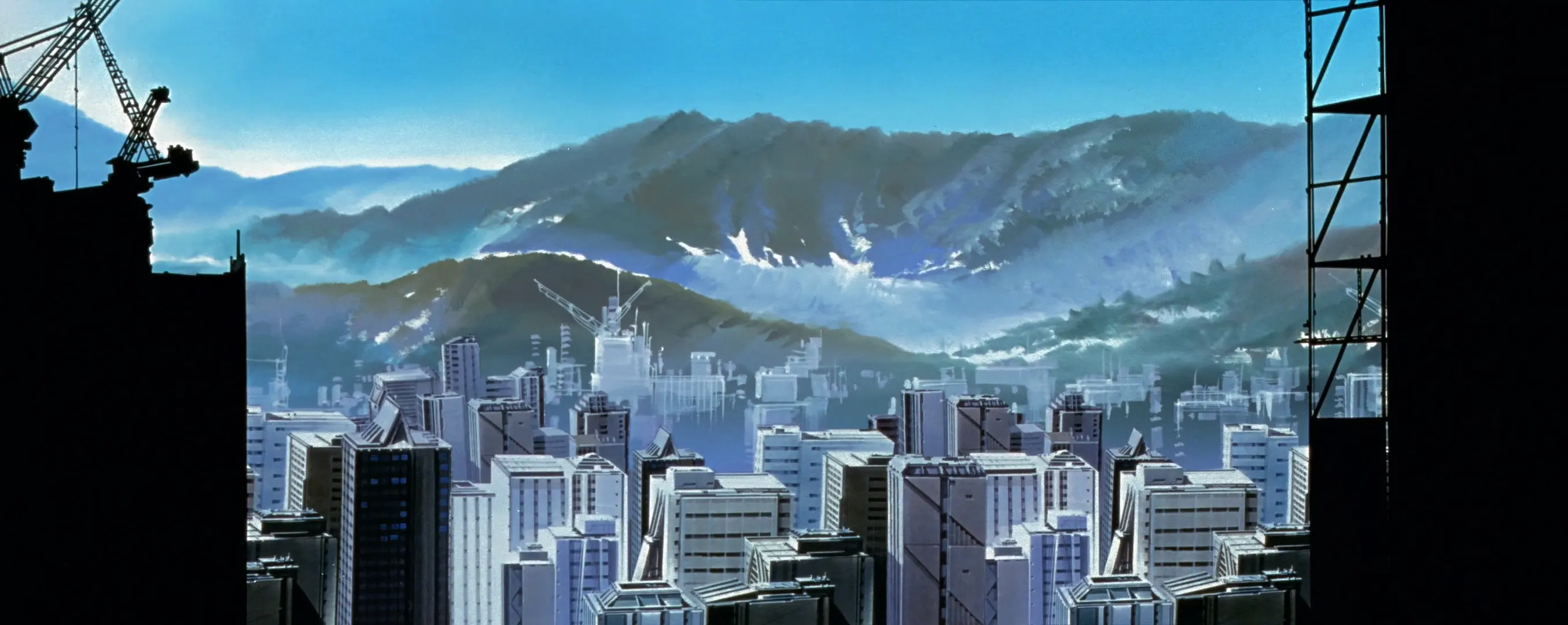
"Violence and fear are not the criteria upon which our conflict can be resolved," says Gendo during 3.0+1.11's last fight scene. Gendo's wisdom and self-awareness are funny at this point, since violence and fear have been driving him for half his life to achieve Human Instrumentality. But he is right: this conflict could only be resolved by Shinji taking time to truly listen to his father, to integrate his past and his father into himself, and finally taking responsibility for his actions, thus finding his individuation and maturity.
The last two episodes, End of Evangelion and 3.0+1.11, show Shinji's individuation wonderfully. Episode 26 mentions, "one who truly hates himself can't come to love and trust others," and finally, Shinji takes responsibility for himself by accepting that he is "cowardly, sneaky, and weak." In 3.0+1.11, he is able to also share his newfound insight with his father, who laments and then asks, "I am weak. Is that why I am forbidden to see you, Yui?" to which Shinji responds with, "I think you cannot see her because you're not willing to accept your weaknesses."
Not only does Shinji finally accept his flawed self as he is without any deflections. He finally puts a stop to the Ikari cycle by not only taking responsibility for himself but also taking responsibility for his father's actions: "I have got to settle the score for what my father did." He decides to "rewrite the world so that it doesn't have Evas. A world where new people can live." The Evas, which his father built as a measure to sacrifice the whole of humanity, which kept him away from his son, so that he could see his Yui again. Gendo failed to realize that what he was hoping for reconnection with Yui was in Shinji all along. Just like Shinji was in Village-3, unable to see the compassionate and vibrant life around him, only focusing on failure and fear. Anything good for them had only created more fear of ruining it.
But what they desired - true connection, some understanding, great friends and companions, someone to share what makes living enjoyable - was always right next to them. It was their own minds which had constructed their constraints that held them in fear. Episode 26 puts it nicely: "it is your mind that separates reality into bad and unpleasant. The mind separates reality from truth. Any new position will change the perception of reality. There are as many truths as there are people, and you have your own truth which you can decide. Your truth can change simply by the way you accept it." Your perception of the world is a reflection of your state of consciousness. Just as this text probably reflects more on me than the show itself. My mind creates Evangelion and how I see it.
And so, I can finally cast aside the Evas as well. In the seven years since I first watched Evangelion, I have lived through and witnessed many of these issues within myself and those around me. I have had the opportunity to learn more about my own past, as well as the past of my parents and how much of who I am stems from their upbringing. I have integrated these experiences into my being and now possess the ability to empathize and comprehend the struggles the characters were facing. I am capable of articulating the deep-rooted traumas that both the characters and I have endured.
おめでと!
